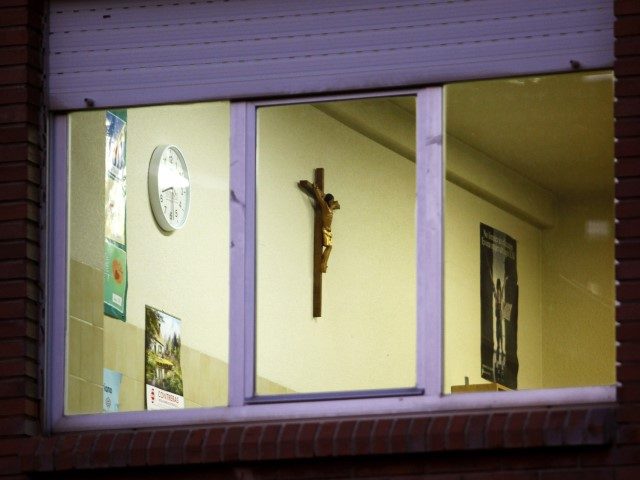The Supreme Court is set to hear oral arguments Wednesday in a Maine case on whether students can use state aid to attend schools that provide religious or “sectarian” instruction.
The case, Carson v. Makin, is centered around parents who wished to send their children to Christian schools using state aid, only to be banned from the assistance program. Pender Makin, commissioner of the Maine Department of Education, contends that the state should not have “subsidize” religious instruction.
The U.S. Court of Appeals for the First Circuit upheld a religious exclusion in Maine’s tuition assistance program for high school students. Under that program, “eligible students may attend the public or private school of their parents’ choice, whether inside or outside of Maine. But they may not receive tuition assistance if they attend schools that Maine deems “sectarian,” according to the petition for certiorari asking for the High Court’s review.
This is the latest installment in an ongoing battle over whether a school’s being religious bars it from receiving state funds.
In a 2017 case, Trinity Lutheran Church of Columbia v. Comer, the Supreme Court held that children’s play areas run by religious organizations could not be disqualified from government grant programs on account of religious status when the money was used to make school playgrounds safer. In the 2020 case Espinoza v. Montana Department of Revenue, the Supreme Court extended the 2017 ruling to say that religious schools could not be disqualified because of religious status even if the money is not explicitly confined to features like playgrounds that are inherently secular.
“The First Circuit seized on what it called Espinoza’s ‘use/status distinction’ to uphold a religious exclusion in Maine’s tuition assistance program for high school students,” according to filings by the religious-freedom law firm First Liberty Institute, and the economic-freedom law firm Institute for Justice.
The Supreme Court must decide whether the Maine law at issue violates the Free Exercise Clause of the U.S. Constitution’s First Amendment.
Makin is arguing that the state’s actions do not violate the Free Exercise Clause because public benefits go to public education, not education in general.
“A religious education is nothing like a public education, as this Court has recognized and as the factual record demonstrates. An education that includes proselytization and inculcation in specific religious beliefs and supports the exclusion of some children and families is antithetical to a public education,” according to Maine’s brief. “…While families are certainly entitled to send their children to religious schools (and Maine law respects that choice by declaring that enrollment in religious schools satisfies attendance requirements), the Free Exercise Clause does not demand that public dollars be used to support it.”
The United States in its brief argues that the parents may not even have standing because “it is unclear whether Temple Academy or BCS would participate in the tuition-assistance program if Section 2951(2) were held invalid,” and that one of the parents’ daughters recently graduated high school, making their claims “moot.” They also contend that the Court has previously distinguished between religious discrimination and the refusal of the government to fund religious activity.
“The government cannot ‘discriminate[] against’ or ‘impose[] a penalty on’ religious exercise by denying generally available benefits based on the recipient’s ‘religious character,’” the court document reads, quoting Trinity Lutheran. “But the Court has distinguished such penalties and discrimination—which effectively penalize constitutionally protected activity that is not government-funded—from mere refusals to subsidize particular religious activities.”
The parents are accusing the state of violating the Free Exercise Clause, the Establishment Clause, and the Equal Protection Clause, saying that “the exclusion is neither neutral toward religion nor generally applicable…,” according to the petitioners’ brief.
“Maine’s exclusion of ‘sectarian’ options from its tuition assistance program violates the Free Exercise, Establishment, and Equal Protection Clauses. This is so regardless of whether the exclusion is viewed as turning on the religious ‘status’ of the excluded schools or the religious ‘use’ to which a student’s aid would be put at an excluded school,” the parents allege, adding that there is no basis for such a distinction in either the text of the Free Exercise Clause or Supreme Court precedent.
“In fact, the Framers chose to protect religious ‘exercise,’ as opposed to mere belief or conscience, to ensure that Americans would be free to live out their faith. This Court, moreover, has never endorsed a distinction between religious status and use as grounds for eluding strict scrutiny of laws that discriminate based on religion,” the court document reads.
The parents argue that Maine has violated the Establishment Clause because its policy “lacks secular purpose” and discriminates between schools that are “nominally religious” and “those that put their faith into practice.”
“Maine’s exclusion also violates the Establishment Clause. It lacks a secular purpose, has a principal effect of inhibiting religion, and, perhaps most problematically, requires excessive government entanglement with religion. To determine whether a student may attend her chosen school, the state must make intrusive inquiries and judgments regarding the school’s religious curriculum and activities. The fact of such inquiry is problematic enough,” according to the brief.
Lastly, the parents claim Maine violates the Fourteenth Amendment’s Equal Protection Clause and flies in the face of the law’s original intent.
“The framers of that clause were particularly concerned with ensuring that religious educators supported by the Freedmen’s Bureau could continue their efforts to educate the freedmen in the wake of the Civil War,” they contend. “It would be perverse to conclude, as the First Circuit did, that the clause offers no meaningful protection to students who seek a religious education today.”
The Supreme Court justices will allow 70 minutes for arguments Wednesday, beginning at 10 a.m. The justices are expected to render a decision by June of 2022.
The case is Carson v. Makin, No. 20-1088 in the Supreme Court of the United States.

COMMENTS
Please let us know if you're having issues with commenting.